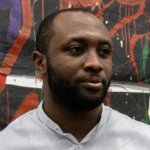
Motive
Always begin by asking yourself why you’re writing anything. What is it saying about the world? What is it saying to you? And even more audaciously, how would you be changed by writing it?
Form
Perhaps the distinction can be made between a writer and a commentator. The latter is more given to questions of theme, of the ideas being conveyed. But a person who treats writing as a vocation is inherently interested in the workings of words, of sentences as raw material. But you’d rarely begin from that granular level: begin by asking yourself questions about form. What kind of writing is this? Is it a piece of journalism, of memoir, of criticism that blends journalism and memoir? A piece of academic writing? Establishing a formal parameter will give you room to think of what is best for the piece.
Theme
For most nonfiction writers, the theme of the work comes first. That is, they are either interested in writing about an experience or invited to write about it. The most important thing to do in this respect is to treat the theme as open-ended. What can be said here that is unusual, or particular?
Consistency
As long as you’ve made the decision to be a writer, keep going. Publishing your work, or receiving acclaim for your work, does not guarantee an ease in the process of writing. One way to keep going is to always seek out an ambitious writing project, and I’d define “ambition” as any project that challenges what you think you’re capable of.
Regimen
A related idea is regimen. You’re going to produce work consistently if you develop a regimen for every project you’ve undertaken. It might be as simple as divvying up a word count over the course of a week, or month, or even longer. Then show up every day to meet your word count.
Correspondences
The aim of reading widely as a writer working for a general audience is for you to set many thinkers and ideas in correspondence with each other. No interest is off-limit—even the theorems of mathematical equations—if it can be connected in a reasoned way to the subject at hand. But do this with restraint: quoting someone or alluding to a theory should be with the intention to proffer a distinct way of bringing ideas together and not to display academic credentials.
Editorship
Be willing to be edited. A writer who feels their work is as good as they intended it to be is rarely correct. You might not agree with what the editor says – or what your friend says when you shared the work – but at least consider if there’s another way of saying what you meant to say, based on their suggestions. Think of the editor as your collaborator; remember that only your name that would be published alongside the piece.
Goal-setting
Be a goal-oriented writer. Except you write for yourself—which I doubt is ever consequential, even if true—aim to get your work out. This would ground you in a certain practicality, and clear-eyedness that is necessary. That practicality ranges in kind from needing to pay your bills, writing about an artist who is your friend, and writing about an artwork that seems to you to be important. All those reasons are valid, and can spur good work.
Solitude
Don’t allow your interests in socializing overshadow the demands of being alone at your desk. Make time for the social but make time for going inwards. The two are not mutually exclusive, but at a certain point – or for certain stretches of time – one has to prioritize. And I hope you choose solitude.
Professionalisation
Treat yourself as a professional. Where possible, ask to be paid, and where possible, ask to be paid higher than what’s offer. Make compromises for the sake of the work, but only if you care about it. And meet your deadlines. If you’re unable to, be diligent to ask for an extension before the due date. Treat your colleagues with courtesy even when you disagree. It’s the way to secure respect, and a peace of mind that keeps you working.
 Emmanuel Iduma is a writer who trained as a lawyer in Nigeria. He is the author of the travelogue A Stranger’s Pose (2018), which was longlisted for 2019 Ondaatje Prize, and I Am Still With You (2023), a memoir on the aftermath of the Nigerian civil war. He has written for Granta, n+1, the New York Review of Books, Aperture, Yale Review, and others. He was awarded a Windham-Campbell Prize for nonfiction in 2022. In 2020, Iduma was recognized in Apollo International Art Magazine’s ’40 under 40 Africa’ for the broad social impact of his work.
Emmanuel Iduma is a writer who trained as a lawyer in Nigeria. He is the author of the travelogue A Stranger’s Pose (2018), which was longlisted for 2019 Ondaatje Prize, and I Am Still With You (2023), a memoir on the aftermath of the Nigerian civil war. He has written for Granta, n+1, the New York Review of Books, Aperture, Yale Review, and others. He was awarded a Windham-Campbell Prize for nonfiction in 2022. In 2020, Iduma was recognized in Apollo International Art Magazine’s ’40 under 40 Africa’ for the broad social impact of his work.
Iduma has an MFA in Art Writing from the School of Visual Arts, New York City, where he taught for several years. He lives in Lagos, Nigeria and Norwich, UK.
Emmanuel is also an NCW Academy online course tutor, and will be leading our upcoming beginners’ memoir course. Find out more →
You may also like...
Top tips to help you achieve your writing goals in 2024
Could 2024 be your year of inspiration? We’re welcoming in the new year with writing tips and techniques we’ve learned over the last year, which will help you to embrace change, push your boundaries, and kickstart your writing journey.

12th December 2023
How to structure a novel
Creative writing tutor Ian Nettleton explains how to structure a novel

8th July 2022
Nine Tips to Cure Writer’s Block
Eliza Robertson and Lucy van Smit help us break writers block with exercises and practices

22nd January 2020






